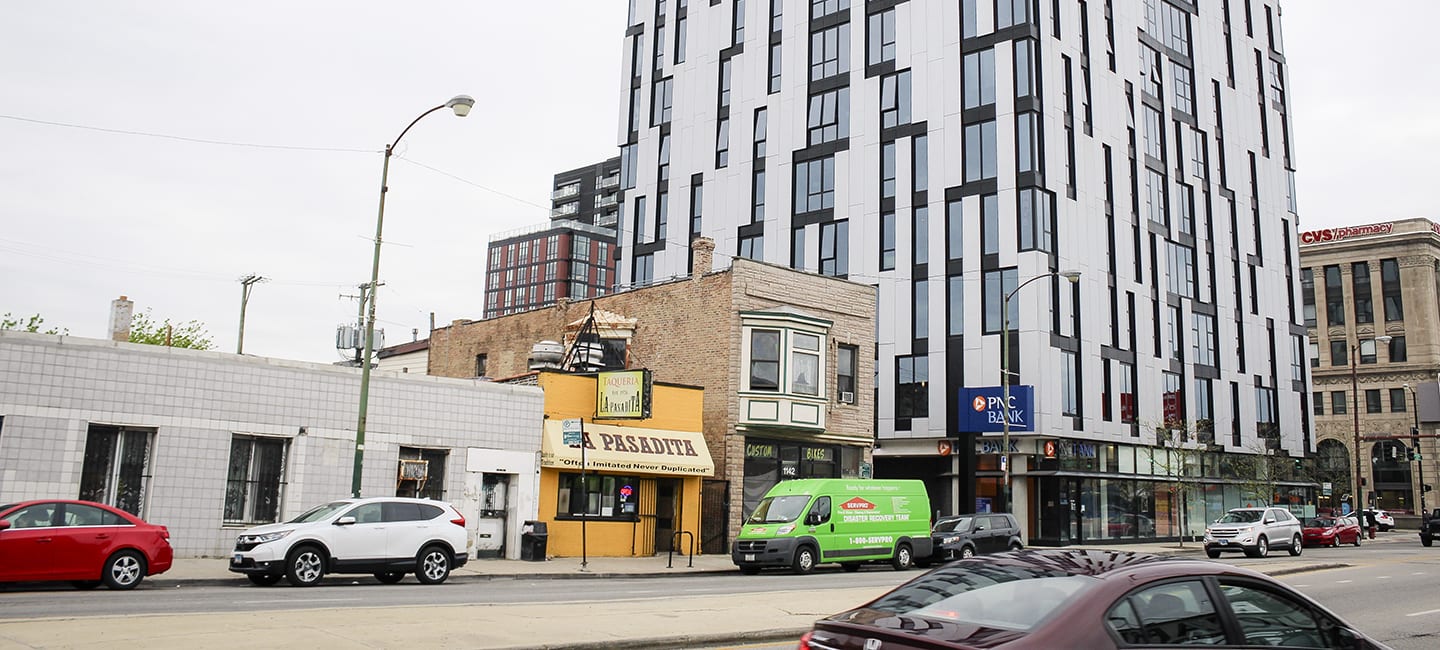 Fernando Moreno for Borderless Magazine
Fernando Moreno for Borderless Magazine Coronavirus has devastated Latino communities in Illinois. But in Chicago’s Wicker Park neighborhood, one family is working and hoping for a better tomorrow.
Update October 26, 2020: We regret to inform our readers that a past contributor was charged with serious crimes and harming vulnerable community members. While the case is not yet resolved, this is a serious allegation. We hold our contributors to the highest standard of ethical behavior and the charges made against this contributor are deeply troubling to Borderless Magazine’s staff and board.
Borderless Magazine no longer has a relationship with the contributor, who reported and photographed this article for us in May 2020. We stand with survivors and we believe in the inherent dignity of every person. Please reach out to us at [email protected] with any additional questions. Need to talk to someone? Call the Chicago-area rape crisis hotline at 888-293-2080.
My mom can decipher the universe from her kitchen. We live in Chicago’s Wicker Park neighborhood and as she stirs her café con leche before the sun rises it’s like the aroma from her taza de barro, or clay cup, makes the world wake up. She starts getting text messages and voicemails from our family in Mexico. She turns on the news and gets ready for her day.
I used to believe world events happened because she said so. “Se infló la tortilla. Va a nacer un niño,” or “The tortilla inflated. A child is going to be born.” Sure enough, someone we know would announce they are expecting. “La salsa salio picosa, alguien esta enojado,” or “The salsa is spicy, somebody is angry.” When my grandma passed away last December, my mom knew that 2020 was going to be a rough year.
The coronavirus pandemic is devastating Mexican-American communities like mine in Illinois. The pandemic has made blatantly clear that many essential workers we depend on to sustain a bit of normalcy today are immigrants. This has cost us much. Latinos make up less than a fifth of the state’s population but have more confirmed COVID-19 cases than any other racial or ethnic group. We also have been amongst the hardest hit by the economic downturn. Nearly half of us have someone in our household who has lost their job or taken a pay cut because of the pandemic.
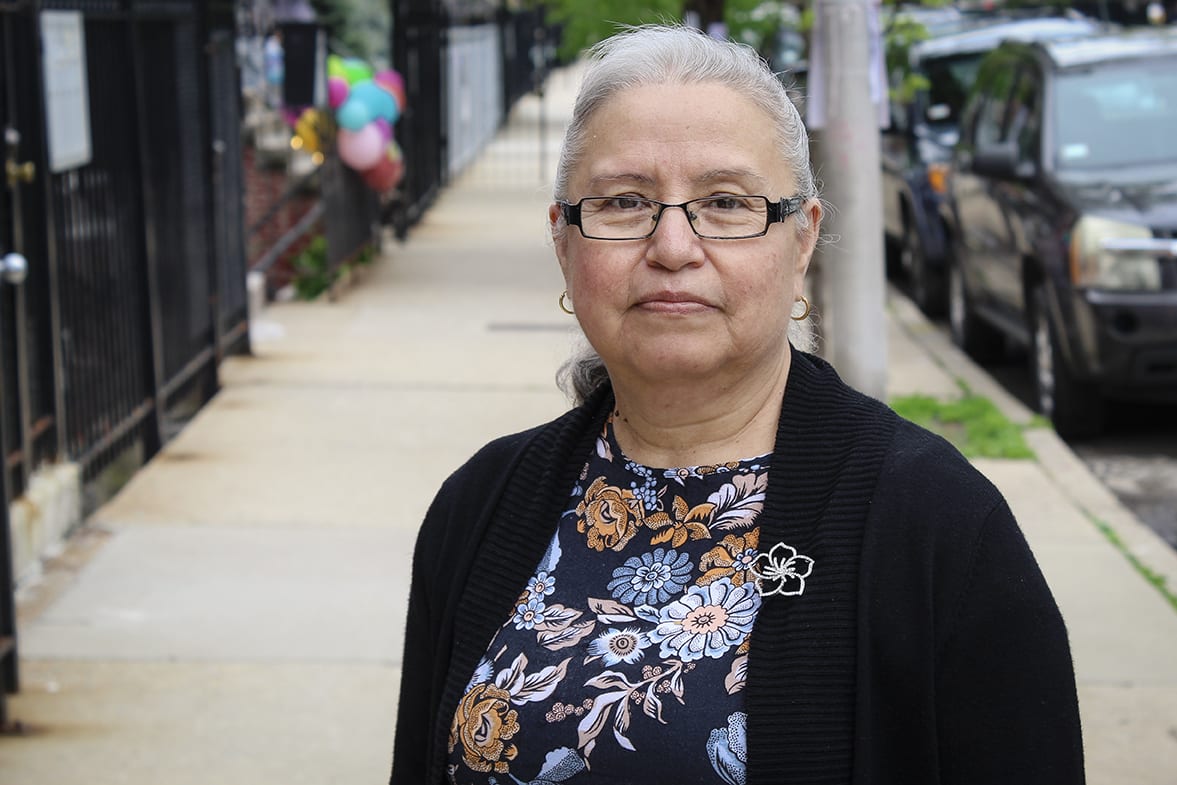
The reporter’s mother, Emma Roa, outside her home in the Wicker Park neighborhood of Chicago, Ill. May 18, 2020. Fernando Moreno for Borderless Magazine
Still, we stay resilient. Whether by choice or by need we know how to rise above our hardships. We work and hope for a better tomorrow. It is the reason we make the trip to El Norte.
This year I’m 36 years old. It’s the same age my mom was when she decided to journey to the United States with me. She was fleeing my father’s abuse and knew women are killed all too often in Mexico. Women in abusive domestic relationships often don’t make it.
I cannot begin to comprehend how much courage my mom had leaving our home 24 years ago. She had to leave behind my older brother, who had run away from home at 13 to escape my father’s abuse, along with many family members and friends.
My mother and I said goodbye to my grandmother at the bus station. It was to be the last time my mom felt her hug. With tears in her eyes she promised my grandmother, “Voy a regresar.” “I will come back.”
She became one of the many immigrants who carry the unfathomable pain of leaving loved ones in search for a better life in a country that despises us and yet needs us.
We arrived in Chicago in January 1996 and have lived on the same street in Wicker Park ever since. We did not know the language when we came and had never seen trees without leaves or fruit on them. We were from the state of Morelos, “el estado de la eterna primavera” or the state of eternal spring. Wicker Park looked somber on the cold winter night when we arrived. My mom took one look at the bare trees and said, “Van a hacer buena leña.” “They will make for good firewood.” Her mind was always focused on our survival.
Wicker Park back then was not the wealthy fashion center it is today. It was a community of low-income immigrant families from Mexico and Poland. It was also the center of gang disputes. When I was around 15 years a young Black man was chased and shot on the street in the middle of the day as my friends and I played soccer. We ran for cover. Once the police and ambulances were gone and the blood was cleaned, we went back to playing. We grew accustomed to shootings almost every day and learning that somebody had gotten shot the night before. There’s nothing normal about it, but to us it was expected.
Despite the hardships we faced here, our tight community of immigrants made our homesickness a bit more bearable. During the pandemic we’ve had an even greater need for comfort as friends lose their jobs and even their lives to the coronavirus.
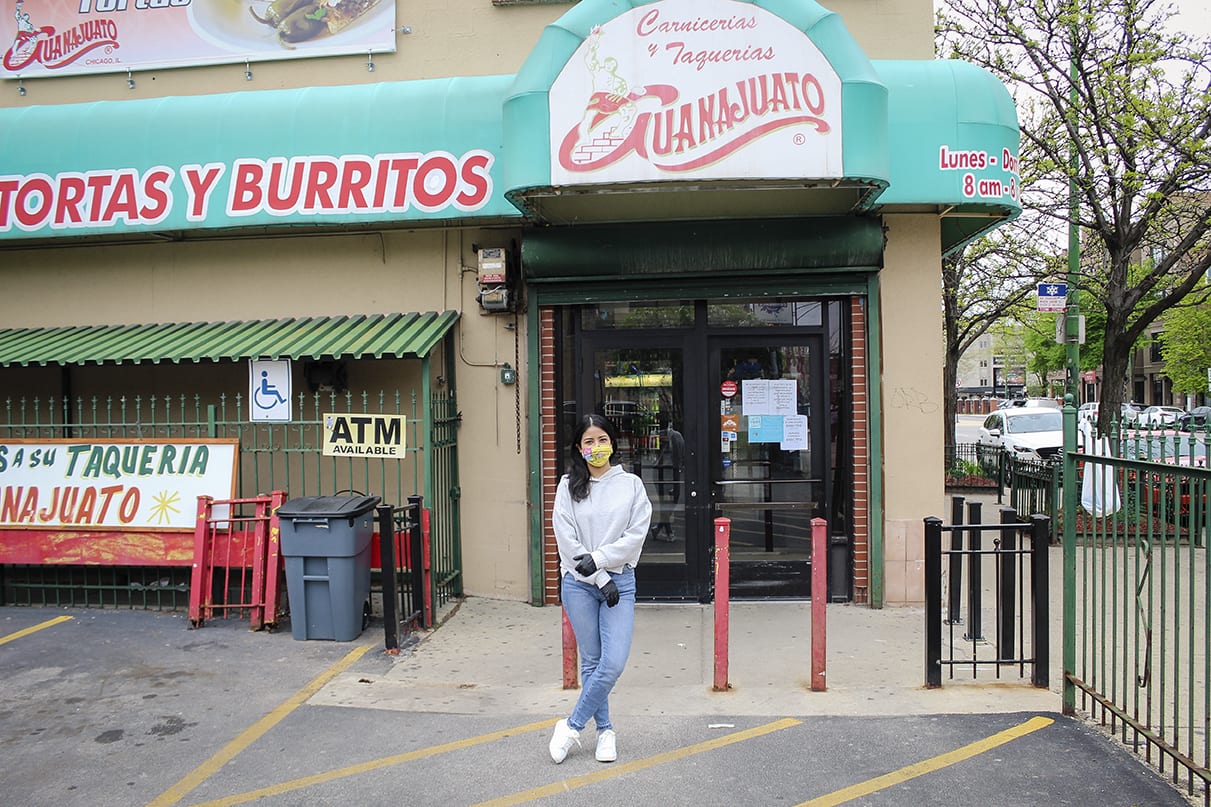
Jazmin Silva is the store manager of Carnicerias Guanajuato, 1436 N Ashland Ave., in the Wicker Park neighborhood of Chicago, Ill. May 14, 2020. Fernando Moreno for Borderless Magazine
I have found solace in a taste of home during this time visiting Mexican-owned businesses near my home that have survived decades of gentrification.
A short walk away is Carnicerias Guanajuato, a grocery store and taqueria on Ashland Avenue. They just celebrated their 35th anniversary and are a beloved family business. The carnitas and chicharrón bring people from all over the city and suburbs, especially on weekends.
It’s not just a neighborhood store but a destination for many Mexican immigrants who continue to eat here despite being pushed out of Wicker Park by high rent prices years ago.
“My dad built this business from scratch,” said store manager Jazmin Silva, on a recent visit. “It’s a privilege to continue what he started and just keep going. We have a lot of our same clientele that we had for years.”
These days I go to Carnicerias Guanajuato wearing a mask. The store is still busy despite the taqueria inside becoming takeout only. But some sections are noticeably bare.
“Even now we are still seeing a lot of shortages,” Silva said, pointing out the lack of meat and tortillas. “There’s things we just don’t get in, or they’ll run out real quick and it’ll be a couple of days until we get some more.”
Still, Silva’s life hasn’t changed all that much since the pandemic began.
“I come to work everyday. I don’t have days off. I’m always working. The only thing that has changed is I have to wear a mask and gloves,” Silva said.
Half a mile south past Division Street on Ashland lies another of my refuges: La Pasadita. David Espinoza’s father started the taqueria in 1976 when David was 11. It’s been a family business ever since. Their famous chiles rellenos are made from a recipe by his grandmother.
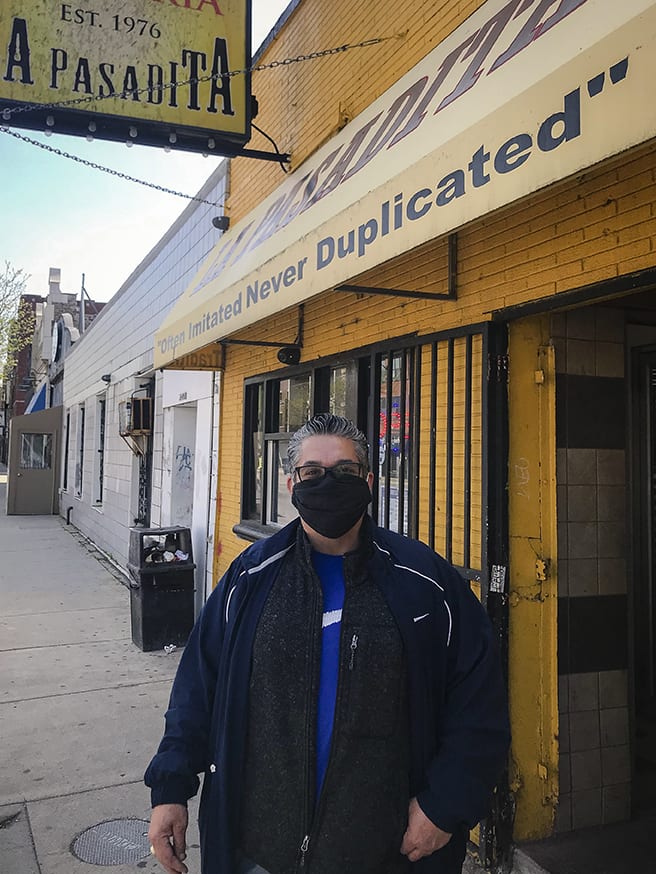
David Espinoza, owner of La Pasadita, in the Wicker Park neighborhood of Chicago, Ill. May 13, 2020. Fernando Moreno for Borderless Magazine
“This is the neighborhood where my parents landed back in 1965,” Espinoza said. “I still get customers who when they were 10 years old their dad would bring them to eat tacos and now they’re bringing their kids to eat tacos, too.”
But the coronavirus pandemic has shaken the business.
“It’s been hard. Our meat prices have doubled,” Espinoza said. “We used to be open until 1:30 a.m.. Now we close at 10:30 p.m. We can’t afford to stay open. The overhead is too heavy.”
The neighborhood bars are closed and there are no Bulls or Cubs games going on. Without that nightlife La Pasadita has lost fifty percent of its regular business, Espinoza said.
“Right now we’re counting our pennies,” he said.
Through tears, Espinoza also worries about his employees who depend on their jobs to feed their families. He has cut back their hours but has refused to lay anyone off.
“We’re all going to get through it. We’re not going to have the same like we used to, but it’s better to have a little than to have nothing,” Espinoza said. “My mother would always tell us, ‘God only gives you what you can handle and you’ll be okay,’ and this is one of those times.”
Those words remind me of my own mother as she comforts my younger brother, sister, and me during the pandemic.
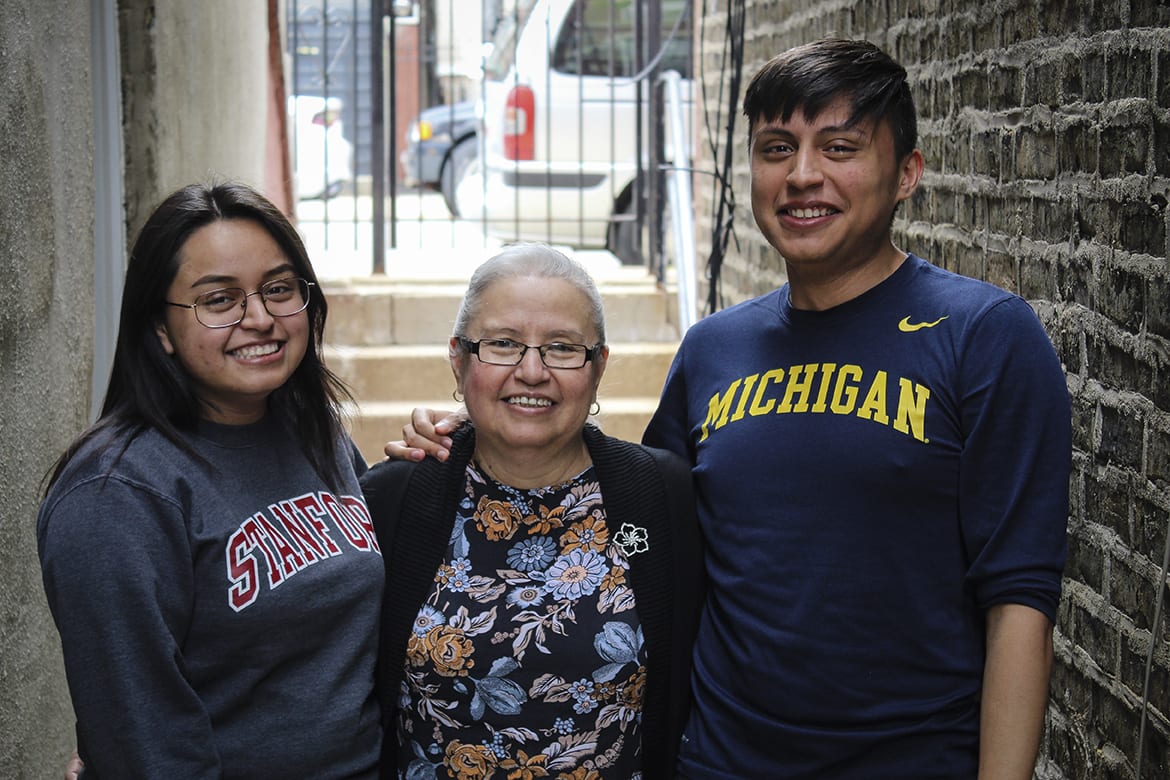
The reporter’s family — Arturo Lopez, Emma Roa, and Abigail Lopez — outside their home in the Wicker Park neighborhood of Chicago, Ill. May 18, 2020. Fernando Moreno for Borderless Magazine
My sister is finishing up her senior year of high school online and was just accepted into Stanford University where she plans to major in astrophysics. Five of us now live in a two-bedroom apartment so there isn’t much room for her to work. She tries to sleep during the day when our mom is using the kitchen table for cooking so she has full reign of the table at night to study.
My brother is graduating from the University of Michigan as an aerospace engineer this December and was supposed to be in South Africa this summer taking part in a NASA research program. He would have been the first person in our family to travel to a different country without having to fear crossing borders. That trip was canceled because of coronavirus.
As a DACA recipient working in the community, I see how immigrant neighborhoods get hit the hardest. Not only are DACA recipients excluded from getting money from the CARES Act but undocumented immigrants are not part of the stimulus package and can’t apply for unemployment. Coronavirus does not discriminate and doesn’t care if you have papers.
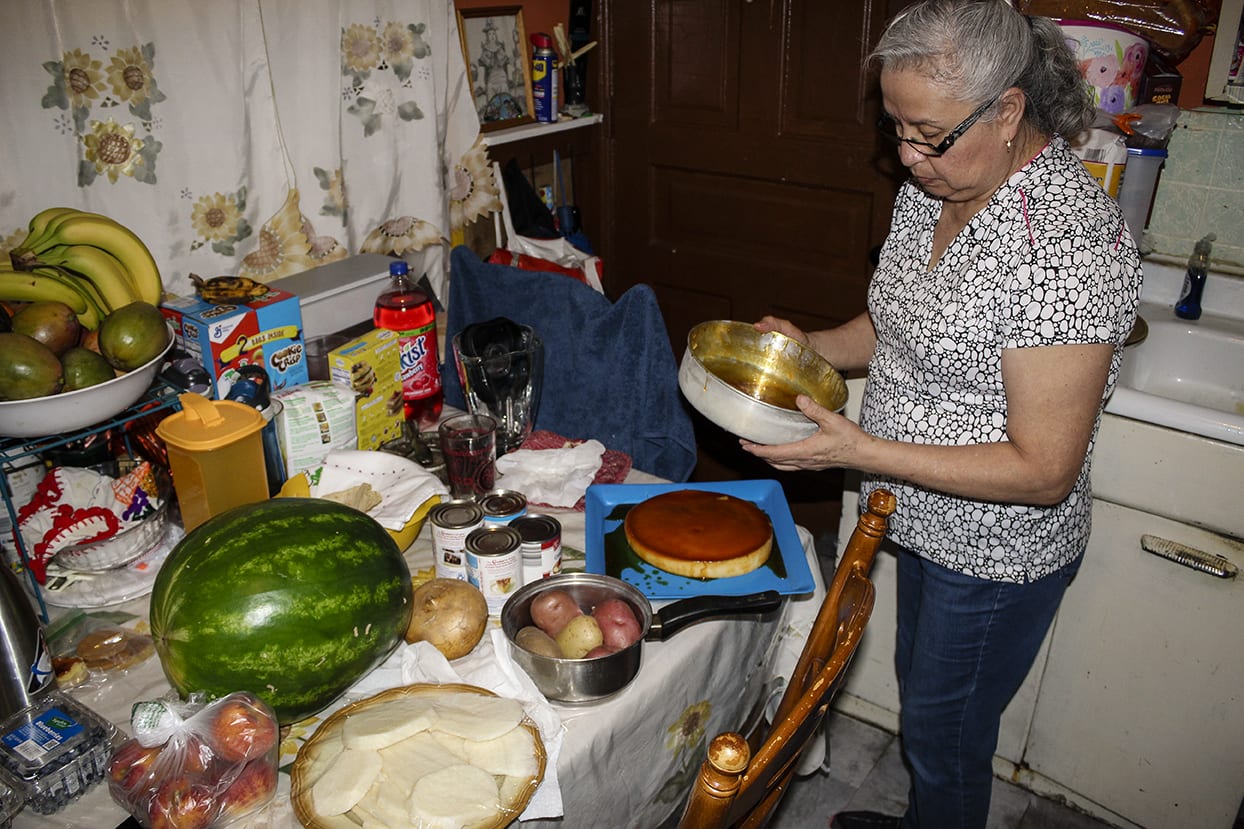
Emma Roa makes flan for her neighbor in the Wicker Park neighborhood of Chicago, Ill. May 12, 2020. Fernando Moreno for Borderless Magazine
Our family, like those of so many other Mexican immigrants in our community, has many reasons to be sad at this time. But my mom says, “La esperanza es lo ultimo que muere.” “Hope is the last thing to die.”
We aren’t sure how or when this pandemic will be under control. But I believe that the future will bring better days. A courageous, loving woman who sips café con leche from her taza de barro raised an astrophysicist, aerospace engineer, and community leader in a small Wicker Park apartment against all odds. She hoped for a better tomorrow and says it’s still possible. It must be because she already had that conversation with the universe from her kitchen table.
Fernando Moreno is the Chief Operations Officer at Spanish Public Radio. He graduated from Northeastern Illinois University and currently serves as Board Chair for First Defense Legal Aid, and is a board member for the Hispanic Business Network and Community Arts Wicker Park.

